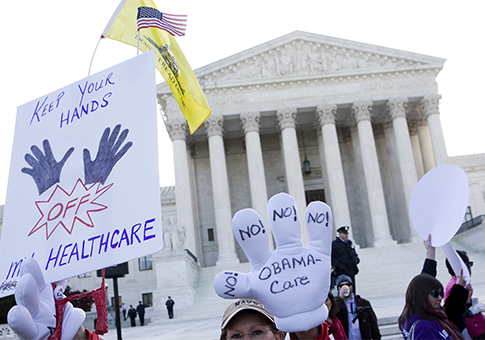Republicans put forward a new alternative to Obamacare on Wednesday that seeks to expand coverage, increase the options for buying insurance, and equalize the tax treatment of insurance bought on the individual market.
The plan, put forward by the Republican Study Committee (RSC), stands as a rebuke to Democrats who have said that Republicans have put forward no alternative to Obamacare. The RSC plan is the second plan put forward by Republicans this year, as Rep. Tom Price (R., Ga.) introduced a plan earlier this year.
"The American Health Care Reform Act" begins by completely repealing the Patient Protection and Affordable Care Act, commonly called Obamacare, and replacing it with a series of changes to the tax code and other health insurance regulations.
"The RSC’s American Health Care Reform Act is a common-sense bill that will lower costs using conservative, free-market solutions which give American families more choices without the unworkable mandates and billions in taxes included in President Obama’s health care law," said RSC chairman Steve Scalise (R., La.) in a statement.
Rep. Phil Roe (R., Tenn.), a doctor and a lead congressman on the RSC’s plan, blamed President Obama for not including any conservative ideas in his signature domestic policy achievement.
"Unfortunately, during the Obamacare debate, no one asked me or any of the other Republican doctors what we thought despite requesting several meetings with the president because I saw this train wreck coming," Roe said in the RSC’s statement.
The bill begins by eliminating the bias in the tax code toward employer-provided health care. Employer-provided insurance will no longer be tax-free, and the RSC plan replaces it with a tax deduction for individuals and families that have health insurance. This shift makes the tax code treat insurance provided through work and bought on the individual market the same.
The bill also sharply expands access to Health Savings Accounts, which some commentators say reduces the cost of health care by making consumers more aware of their expenses.
The bill attacks the problem of individuals with pre-existing conditions in a couple of ways. It modifies existing law to make it easier for people to maintain insurance coverage. If they continuously carry insurance, they are legally protected against rate increases because of a preexisting condition.
The bill also expands access to high-risk pools in states. High-risk pools are subsidized insurance pools with a capped premium to prevent costs from rising.
The RSC’s plan tries to increase competition in the insurance market by allowing people to buy insurance from different states. People can currently only buy insurance in the state in which they live.
Obamacare tries to use competition to drive down prices by setting up state-based "exchanges" where people can buy insurance. However, some states are complaining that the exchanges are not facilitating competition since only a few insurance providers are offering plans on the exchanges. Only two companies are offering plans on the exchange in Kansas, for example.
The bill also reforms legal liability laws in an attempt to drive down the cost of medical malpractice insurance, which contributes to the cost of health care.
The RSC’s reform plan does not significantly address Medicare, which some experts have said is an essential area to reform since it makes up such a large part of the health care economy in America.
Merrill Matthews, a health policy expert at the Institute for Policy Innovation, said some parts of the bill are a good idea, while others will not have much of an impact.
Matthews described the protections for people with pre-existing conditions as "good ideas."
"The actual health insurance market has been heading [toward the expansion of HSAs] for years," Matthews said. "So the proposal might give it a push, but it's heading in the right direction now."
However, Matthews predicted that tort reform and the ability to buy insurance across state lines were, while good ideas, not likely to impact the cost of healthcare.
